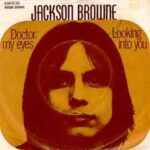 Jackson Browne’s “Doctor My Eye,” released in 1972 on his self-titled debut album, is a song that immediately establishes the young singer-songwriter’s unique perspective: keenly observant, intellectually restless, and emotionally resonant. At first glance, it may appear as a straightforward reflection on anxiety and the modern human condition, but Browne’s lyricism, melody, and arrangement transform it into a quietly powerful meditation on perception, self-awareness, and the pressures of everyday life. “Doctor My Eye” is both a snapshot of early-1970s introspection and a timeless exploration of how we confront the complexities of consciousness.
Jackson Browne’s “Doctor My Eye,” released in 1972 on his self-titled debut album, is a song that immediately establishes the young singer-songwriter’s unique perspective: keenly observant, intellectually restless, and emotionally resonant. At first glance, it may appear as a straightforward reflection on anxiety and the modern human condition, but Browne’s lyricism, melody, and arrangement transform it into a quietly powerful meditation on perception, self-awareness, and the pressures of everyday life. “Doctor My Eye” is both a snapshot of early-1970s introspection and a timeless exploration of how we confront the complexities of consciousness.
From the opening notes, the song sets a contemplative tone. The acoustic guitar, crisp and deliberate, frames Browne’s vocals in a way that draws the listener in. The arrangement is deceptively simple — acoustic strumming punctuated by subtle bass and restrained percussion — but every element is carefully chosen to support the song’s emotional resonance. This simplicity allows Browne’s voice and lyrics to dominate, creating a sense of intimacy, as if he’s confiding directly in the listener.
Lyrical Brilliance and Observational Clarity
Browne’s lyrics in “Doctor My Eye” showcase his early ability to combine literary sensibility with personal reflection. The song opens with the lines: “Doctor, my eyes / Tell me what’s wrong with me / I’m feeling so nervous / I just don’t know what to see.” From the outset, Browne communicates a sense of unease and self-scrutiny. It’s a confession that resonates on multiple levels: personal anxiety, existential uncertainty, and a broader commentary on a world filled with ambiguity.
The lyrics’ power lies in their balance between specificity and universality. Browne paints precise images — the nervousness, the need for clarity, the struggle to interpret what one sees — yet these images speak to anyone who has ever questioned their own perceptions or wrestled with inner doubt. Unlike many contemporaneous singer-songwriters who leaned heavily on confessional storytelling, Browne frames his introspection with a universal lens, allowing listeners to insert themselves into the narrative.
The recurring plea to the “doctor” in the chorus functions as both literal and metaphorical. On one level, it’s a simple appeal for guidance, a desire for someone to diagnose what ails him emotionally or mentally. On another level, it represents the human yearning for understanding in a complex, sometimes disorienting world. By personifying the need for clarity through the figure of the doctor, Browne captures the tension between vulnerability and the search for control — a theme that runs through much of his early work.
Vocal Delivery: Observant and Reflective
Browne’s vocal performance in “Doctor My Eye” is understated but highly effective. His tenor voice carries a quiet intensity that mirrors the song’s themes of self-examination and curiosity. There’s no over-dramatization, no attempt to overpower the arrangement with vocal acrobatics. Instead, Browne employs phrasing and tonal nuance to convey emotion, from the tentative opening lines to the more insistent repetitions of the chorus.
This vocal restraint is a key element of the song’s lasting impact. It allows the listener to focus on the lyrics while creating an intimate, confessional atmosphere. Browne’s delivery conveys intelligence and sensitivity — qualities that became hallmarks of his songwriting career. Listening to “Doctor My Eye” feels less like hearing a song and more like participating in a private conversation about the anxieties of modern life.
Instrumentation: Subtlety as Strength
Musically, “Doctor My Eye” is a study in restraint and focus. The acoustic guitar forms the song’s backbone, its steady strumming providing both rhythm and texture. The bass, while subtle, anchors the song and adds depth without dominating the mix. Percussion is minimal, primarily using soft drum taps and occasional cymbal swells, which enhances the meditative quality of the track.
The song also benefits from the occasional electric guitar flourishes, which punctuate key moments and provide a gentle contrast to the acoustic base. These instrumental touches are never flashy; they exist to reinforce the mood and emotion of the song. This approach to arrangement demonstrates Browne’s understanding that less can be more, particularly in music that relies heavily on lyrical and vocal expression.
The production, handled with clarity and precision, complements the instrumentation perfectly. Each instrument occupies its own space, and there’s an organic quality to the recording that emphasizes authenticity and intimacy. The listener feels as though they are in the room with the musicians, witnessing the performance in real time — a quality that enhances the confessional nature of the lyrics.
Context in Browne’s Early Career
“Doctor My Eye” holds a pivotal place in Jackson Browne’s early career. Released as part of his 1972 debut album, it showcases the songwriting talents that would define his career: keen observation, emotional honesty, and a thoughtful approach to melody and harmony. While other tracks on the album explore love, social commentary, and personal reflection, “Doctor My Eye” stands out for its focus on introspection and perception.
The song also reflects the broader musical landscape of the early 1970s. Singer-songwriters like James Taylor, Carole King, and Cat Stevens were redefining the possibilities of rock and folk, emphasizing personal expression, introspection, and storytelling. Browne’s work fits squarely within this movement but distinguishes itself through a more cerebral, slightly anxious lens. Whereas some contemporaries focused on comfort and reassurance, “Doctor My Eye” confronts uncertainty and the complexities of self-awareness, a thematic choice that resonates with listeners even decades later.
Themes of Observation and Anxiety
One of the most compelling aspects of “Doctor My Eye” is its exploration of perception and anxiety. Browne’s repeated questioning of the doctor is not only a literal concern for health or clarity but also a metaphor for the human need to make sense of a confusing world. The song captures the tension between observation and understanding — the idea that seeing something clearly doesn’t necessarily mean comprehending it.
This theme is particularly relevant in the context of the early 1970s. America was navigating political unrest, social change, and post-Vietnam War reflection. “Doctor My Eye” captures the internal reflection that paralleled external uncertainty, making it both personally and culturally resonant. Its introspection is not self-indulgent; it mirrors the broader existential concerns of a generation trying to reconcile ideals with reality.
Melodic Construction and Musical Flow
Melodically, “Doctor My Eye” is deceptively intricate. Browne employs subtle chord changes and melodic shifts that maintain interest without overwhelming the listener. The verses are primarily grounded in a comfortable acoustic progression, but small variations in chord voicings and rhythm create a sense of movement and narrative progression.
The chorus, while repetitive, reinforces the song’s central theme. Its melodic contour is memorable without being overly dramatic, and its phrasing allows Browne to explore different vocal inflections. This balance of repetition and variation keeps the listener engaged and enhances the song’s reflective mood.
The bridge introduces a slight harmonic variation, momentarily expanding the tonal palette and providing contrast to the main progression. This subtle shift mirrors the lyrical theme of searching for understanding, offering a musical analogy for the process of questioning and introspection. By integrating these elements seamlessly, Browne demonstrates his mastery of melody and song structure, even early in his career.
Emotional Resonance and Timelessness
Despite being over fifty years old, “Doctor My Eye” retains its emotional impact. The song’s themes — uncertainty, introspection, and the search for clarity — are timeless. Every generation can relate to the tension between what we observe and what we understand, and Browne’s performance captures this universality with nuance and authenticity.
The combination of intimate vocals, thoughtful lyrics, and restrained instrumentation creates a track that encourages repeated listening. Each play reveals new details — a subtle guitar figure, an inflection in Browne’s voice, a harmonic nuance — adding layers of meaning and emotional resonance. It’s a song that rewards attention and reflection, embodying the enduring qualities of classic singer-songwriter music.
Influence and Legacy
While “Doctor My Eye” was not a chart-topping single like some of Browne’s later work, it played a crucial role in establishing his reputation as a serious, thoughtful artist. The song influenced a generation of singer-songwriters who admired his ability to blend introspection, observation, and melodic sophistication.
Its influence is also evident in Browne’s subsequent career. The themes explored in “Doctor My Eye” — perception, anxiety, personal reflection — recur throughout his catalog, from Late for the Sky to The Pretender. The song is a blueprint for Browne’s artistic voice, demonstrating his commitment to lyrical honesty and emotional depth.
Moreover, “Doctor My Eye” exemplifies the potential of understated songwriting. It proves that complexity in music doesn’t require grandiosity; careful attention to lyrics, melody, and arrangement can create a song that is both intellectually engaging and emotionally moving.
Conclusion: A Quiet Masterpiece
Jackson Browne’s “Doctor My Eye” is a testament to the power of subtlety, observation, and lyrical precision. Its combination of intimate vocals, understated instrumentation, and thoughtful lyrics creates a song that resonates across decades. The track captures the tension between observation and understanding, anxiety and acceptance, clarity and confusion — themes that remain universally relevant.
It is a song that rewards close listening, offering new insights with each play. Browne’s craftsmanship, emotional honesty, and melodic sensibility make “Doctor My Eye” a timeless work of art. More than just a track on a debut album, it is an enduring exploration of the human condition, delivered with grace, precision, and profound empathy.
Even today, the song’s quiet power remains undeniable. It is a reflection of a generation, a masterclass in singer-songwriter technique, and a reminder that sometimes the most impactful songs are those that listen as much as they speak. “Doctor My Eye” does all of this and more, securing its place as one of Jackson Browne’s most compelling and enduring early works.


